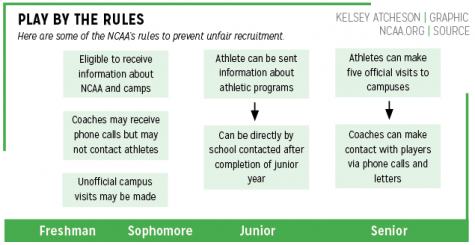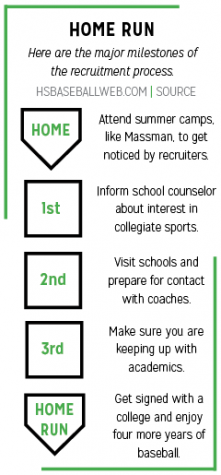
“I didn’t even really know what I wanted in a college at that point, so I had to do a lot of research. At the same time, it was a cool feeling knowing that college coaches were interested at such an early stage,” Massman said.
Despite the “cool feeling” of young recruitment, much can change before a student-athlete reaches college. Athletes aren’t allowed to sign their National Letter of Intent (NLI) until their senior year, but many commit long before they sign.

Massman said many baseball players commit even before their freshman year of high school.
“A lot of people in eighth grade aren’t even mature yet, like their bodies aren’t mature. You don’t even know what you really want in a school, and you haven’t even really thought about it as an eighth grader. I mean, I was still having trouble as a junior in high school, so I definitely think that colleges are recruiting too early,” Massman said.
According to the National Collegiate Athletic Association (NCAA), 480 thousand athletes participated in a college sport in the 2014-15 school year, 34 thousand of whom were baseball players like Massman. However, that number plummeted from high school to college. In high school, there were 486 thousand students who played baseball, meaning only 7 percent of these high school athletes played in college. Other sports show a similar trend, making the recruiting process even more stressful for students.
“(The recruiting process was) very emotionally draining on family, athlete and coaches,” Katie Bailey, college gymnast and freshman at Lindenwood University, said via email.
Bailey started emailing colleges freshman year of high school but didn’t commit until the beginning of her senior year.
Bailey, Massman and Inskeep all said colleges recruit too early, and certain schools have responded to these complaints. For example, on Sept. 21, the Ivy League proposed new legislation preventing colleges from offering financial aid or admission support before the athlete’s junior year. Coaches also cannot communicate with the student-athlete, whether by phone, unofficial visits or in person during camps or clinics.
Massman said, “There’s gonna be a lot of ups and downs and stuff, but just remember that in the end, if someone wants you, you’re gonna play somewhere.”
